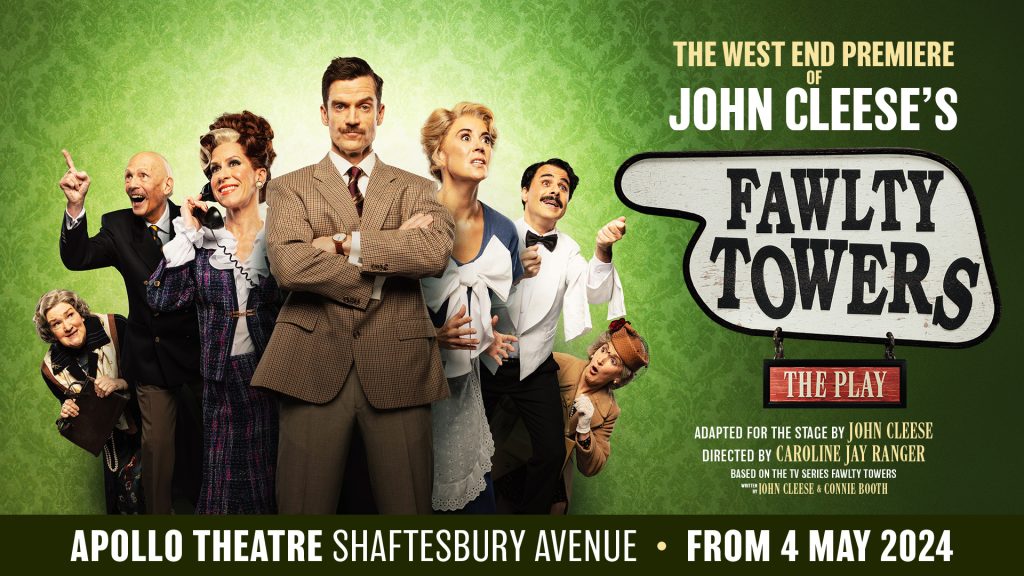FAWLTY TOWERS Returns to the West End
The sign outside may read “Fawlty Towers,” but there’s nothing faulty about the excitement building for one of Britain’s most beloved comedies. This summer, the classic stage adaptation of Fawlty Towers makes a triumphant reappearance in the West End, once again beckoning fans into the wonderfully chaotic world of Basil Fawlty. From John Cleese’s razor-sharp script to the comedic brilliance that has enthralled audiences for half a century, this revival promises to keep everyone on the edge of their seats—chuckling at Basil’s outbursts, sighing at Manuel’s confusion, and marvelling at the entire staff’s knack for turning everyday tasks into comedic pandemonium.
A Comedy Legacy Half a Century Strong
When Fawlty Towers first aired on the BBC in 1975, few could have predicted it would cement itself as a cornerstone of British television. Co-written by John Cleese and Connie Booth, the sitcom’s distinct brand of farcical humour, underpinned by Basil’s perpetual exasperation, made it an instant cult classic. The original show only ran for two short series—twelve episodes in total—yet the comedic impact has far outlived its modest broadcast window.
Fast-forward to the present day, and Cleese continues to champion the show’s timeless humour, bringing it to the stage for new generations to enjoy. As the comedic legend explained: “It’s heart-warming that West End audiences still think Fawlty is as funny as ever. September this year will mark exactly 50 years since the first ever episode was broadcast on the BBC, but here we are, all these years later, still making theatres rock with laughter.” For aficionados who grew up quoting Basil’s quips, or for theatre-goers newly discovering the brilliance behind lines like “Don’t mention the war,” this revival underscores just how enduring the show’s brand of comedic chaos remains.
The Return to the Apollo Theatre
The production’s next stop is none other than the Apollo Theatre in the West End, a fitting location for a show whose comedic chops have stood the test of time. Performances will begin on 24 June and run through 13 September 2025, capping off a months-long comedic marathon that’s sure to be brimming with sold-out houses and roaring applause. The current run is set to wrap up in early March, making this return engagement something of a celebratory encore.
The director, Caroline Jay Ranger, also helmed Only Fools and Horses: The Musical, another stage adaptation of a beloved British sitcom. Her success with that show suggests she knows a thing or two about turning classic TV humour into crowd-pleasing theatre. With Fawlty Towers, she inherits a comedic legacy that demands precision timing and fearless physical comedy—much of which depends on the synergy between Basil’s manic frustration, Sybil’s pointed sarcasm, Polly’s relentless competence, and Manuel’s endearing cluelessness.
A Seasoned Creative Team
It’s not just the comedic script that guarantees laughs, but also the behind-the-scenes craft. For this production, set and costume designer Liz Ascroft returns to replicate that iconic Torquay hotel vibe, ensuring fans instantly recognise the ruddy carpets and plush chairs that make Basil’s misguided sense of grandeur so tangible. Meanwhile, Ian Scott is in charge of lighting, Rory Madden handles sound design, and Anne Vosser presides over casting—a role that’s pivotal for bringing these famously mismatched characters to life.
To keep the show running smoothly, Denise Ranger is on board as assistant director, with Chris Kiely stepping in as resident director. It’s a well-assembled creative team, all working in harmony to ensure the comedic spirit of the BBC classic translates seamlessly to a West End stage. Given the success of the show’s previous runs, the production feels primed to meet the high expectations of returning fans, as well as those stepping into Basil’s world for the first time.
Bringing Back Basil
While revivals sometimes appear to rely on nostalgia, Fawlty Towers is more than just a throwback. Its enduring popularity owes much to the fact that it was a comedic outlier at the time of its original broadcast. Episodes often revolve around simple misunderstandings taken to absurd heights, overshadowed only by Basil’s comedic outbursts. Fifty years on, the formula remains fresh: confounding mishaps escalate from mild annoyance to near-catastrophe in minutes, a form of structured chaos that modern audiences still find uproariously funny.
Moreover, comedic timing in Fawlty Towers is unparalleled. Scenes famously build tension until an inevitable meltdown. This stage production provides fans with a chance to watch that tension unfold in real time—unfiltered and immediate. There’s something deeply satisfying about watching Basil try, and fail, to maintain decorum, especially when everything else is collapsing around him.
The Theatrical Twist
One might ask: “How does a stage adaptation capture the show’s frantic pacing and split-second comedic shifts?” The short answer is: with a meticulous script and a whole lot of rehearsal. Basil’s comedic tantrums require razor-sharp timing, often weaving in physical stunts—like ducking a flying tray or stumbling through swinging doors with a comedic grace. On television, multiple takes can shape the final product. On stage, however, it’s all live, where the show’s success hinges on the cast’s ability to spontaneously respond to any slip-up.
In a theatrical setting, the audience becomes a silent (or not-so-silent) participant in Basil’s meltdown. Each flub by Manuel or quip by Sybil prompts real-time laughter that can spur the actors on, or even lead to a moment of improvisation. The result? A comedic experience you can’t replicate with a DVD box set or streaming service. It’s the intangible energy of live performance that truly lets Fawlty Towers shine again and again.
Staged Laughter Across the UK—and Beyond
Following its West End run, the show embarks on a major tour commencing this autumn. It’s a move that aligns with Britain’s broader love affair with comedic revivals—testament to how local theatres across the nation eagerly welcome iconic British sitcoms turned stage hits. Each regional audience might have its unique comedic sensibilities, but the universal appeal of Basil’s outbursts and Manuel’s missteps transcends local nuance.
Could a global tour be next? Fawlty Towers already boasts an international fan base, from Australia (where it retains a cult following) to North America (where the show’s brand of British absurdity still resonates). If the West End season draws the kind of crowds producers expect, there’s every chance we might see the stage adaptation pop up overseas. After all, comedic friction between incompetent staff and exasperated guests is a universal language.
Data That Speaks to Its Popularity
While exact ticket sales remain hush-hush, producers note that previous runs of Fawlty Towers have consistently sold out or come close, suggesting a strong appetite for comedic nostalgia. Anecdotal evidence from box offices also indicates that multi-generational families attend together—a 60-year-old fan introducing the show to a 20-year-old, for instance. That shared laughter bridges decades of comedic history, proving that Basil’s bungling remains relevant in an era saturated with more polished, formulaic sitcoms.
Plus, the timing couldn’t be better. The show’s new West End run overlaps with the 50th anniversary of the original programme’s first BBC broadcast in September. For those who’ve grown up quoting lines like “He’s from Barcelona,” it’s the perfect cultural milestone to revisit the comedic gem. For producers, it’s also a canny bit of event marketing, aligning nostalgic sentiment with live theatre excitement.
Could Fawlty’s Formula Inspire Others?
One unique aspect of Fawlty Towers is its perfect comedic recipe: a limited setting (the hotel), a handful of well-drawn characters, and scripts that escalate from mild mishap to full-blown farce within 30 minutes. This approach has inspired countless sitcoms around the globe, and stage adaptations of similarly beloved British comedies—like Only Fools and Horses or Dad’s Army—have had success in transferring from screen to stage.
What’s to stop Australian theatre companies from similarly adapting local comedic icons for the stage? Just imagine a theatrical version of a long-running Aussie sitcom, with an immersive hotel environment or pub setting. In an era when audiences crave both nostalgia and live engagement, comedic stage revivals could be a blueprint for success. Admittedly, pulling it off requires an expert combination of comedic writing and top-tier direction. But the success of Fawlty Towersproves it’s far from impossible.
Ready for Check-In
As the West End gears up for yet another round of Basil’s tirades and Manuel’s misinterpretations, it seems clear that Fawlty Towers is a comedic gift that keeps on giving. John Cleese has said it best: “Here we are, all these years later, still making theatres rock with laughter.” After five decades, the show remains a testament to the power of well-crafted scripts and unforgettable characters. In a cultural landscape filled with big-budget musicals and edgy new plays, a return to Torquay’s worst-managed hotel is refreshingly simple—and yet, delightfully chaotic.
So mark your diaries for 24 June to 13 September 2025, when the Apollo Theatre will once again become a comedic war zone of mix-ups, meltdown, and mercurial madness. Whether you’re a longtime fan or a newcomer curious about why Basil Fawlty remains one of Britain’s most iconic comic figures, this revival looks set to affirm that the best comedic writing is truly timeless. After all, in a world of constant change, sometimes you just want to laugh at someone else’s calamities—especially when they’re as brilliantly orchestrated as Basil’s. And if you haven’t purchased tickets yet, don’t dally too long; the hotel may be chaotic, but the house will definitely be packed.



